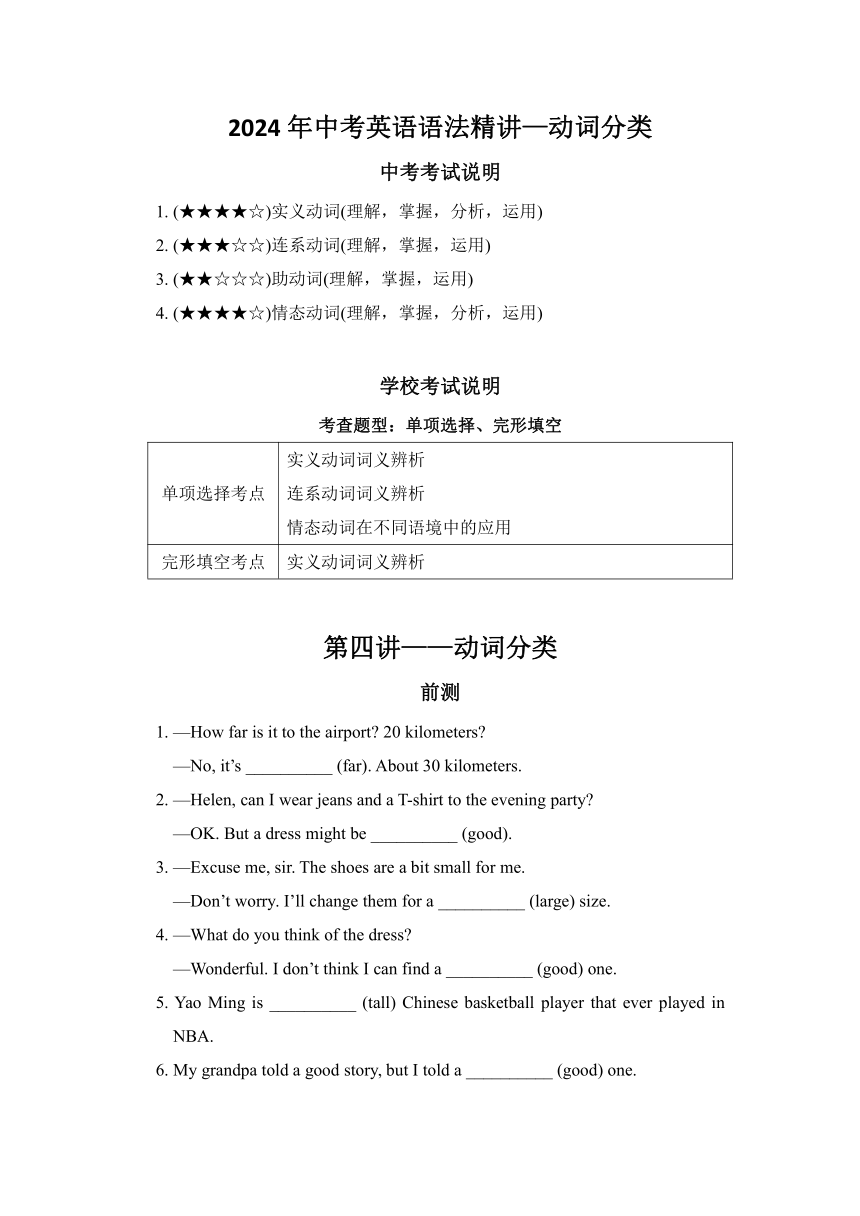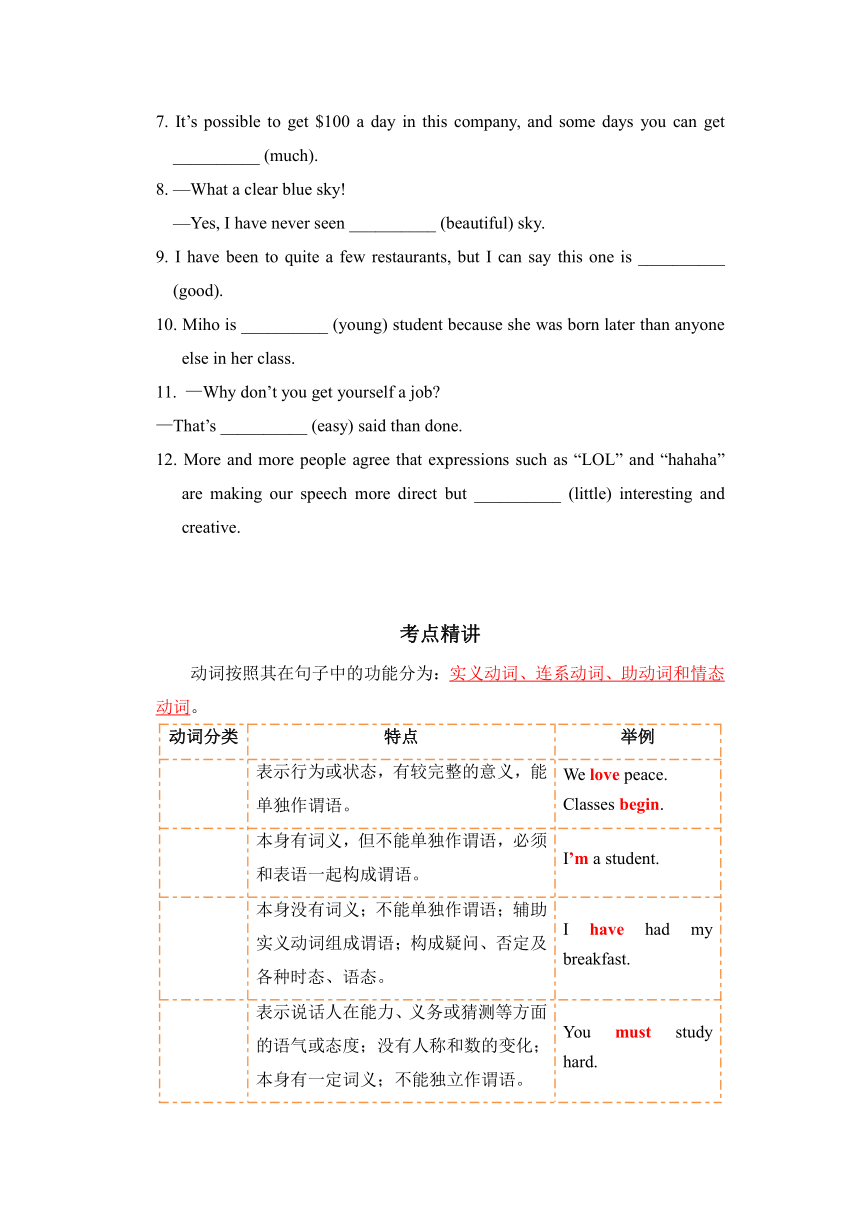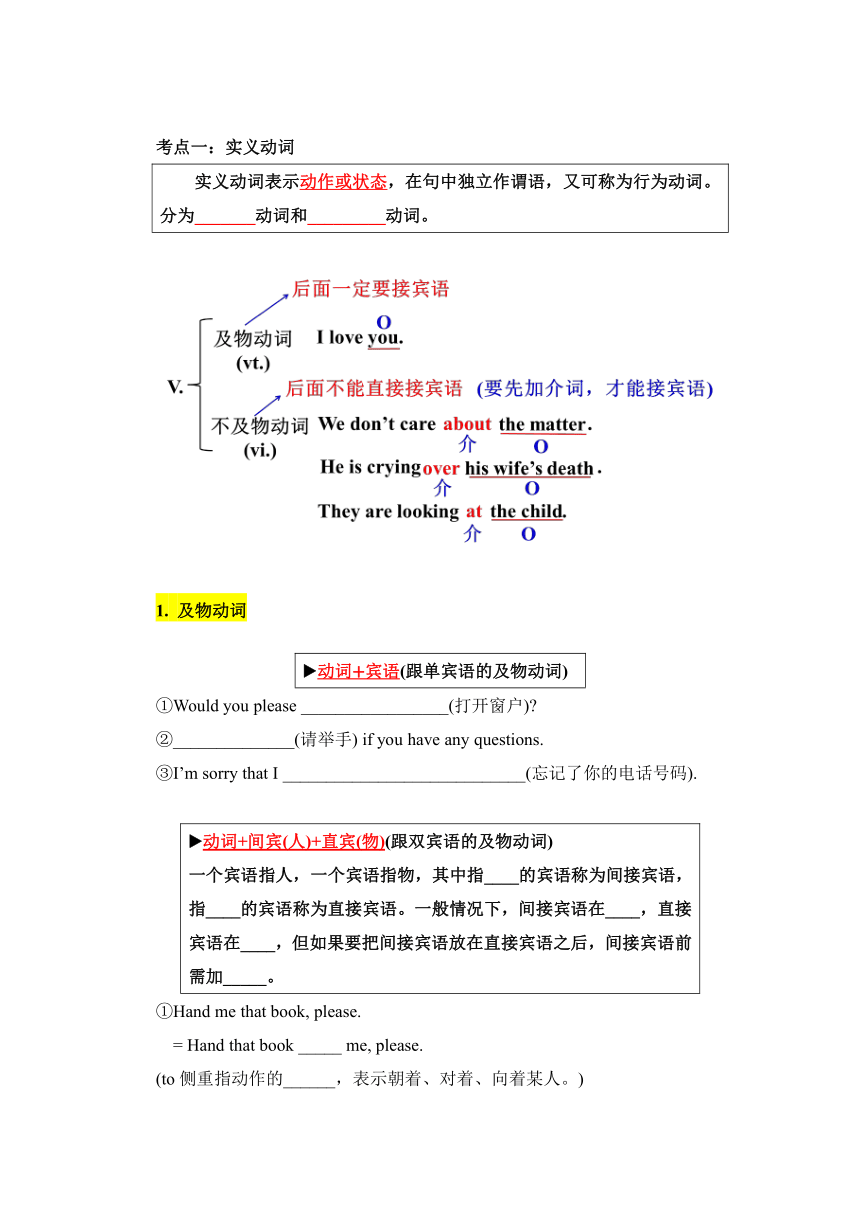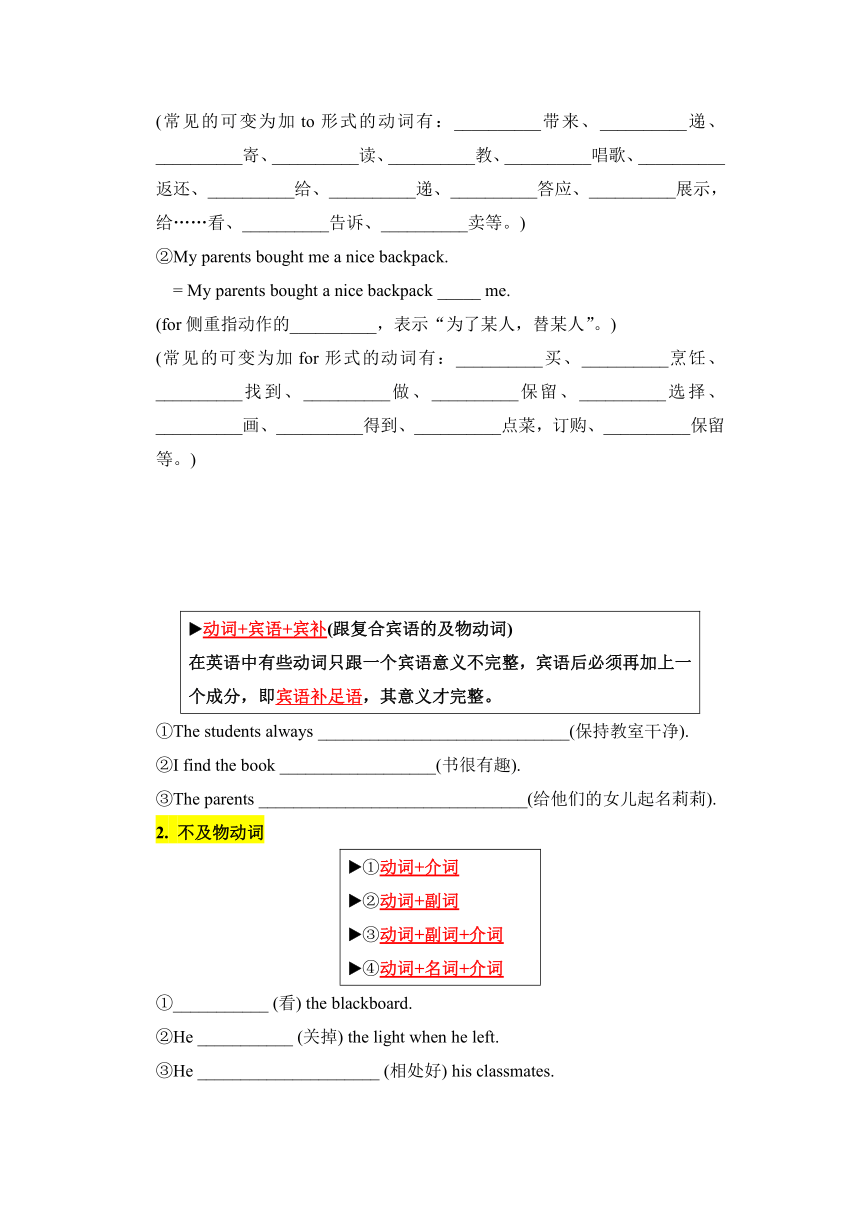2024年人教版中考英语语法精讲—动词分类(无答案)
文档属性
| 名称 | 2024年人教版中考英语语法精讲—动词分类(无答案) |

|
|
| 格式 | docx | ||
| 文件大小 | 115.3KB | ||
| 资源类型 | 教案 | ||
| 版本资源 | 人教新目标(Go for it)版 | ||
| 科目 | 英语 | ||
| 更新时间 | 2024-05-10 06:47:35 | ||
图片预览




文档简介
2024年中考英语语法精讲—动词分类
中考考试说明
1. (★★★★☆)实义动词(理解,掌握,分析,运用)
2. (★★★☆☆)连系动词(理解,掌握,运用)
3. (★★☆☆☆)助动词(理解,掌握,运用)
4. (★★★★☆)情态动词(理解,掌握,分析,运用)
学校考试说明
考查题型:单项选择、完形填空
单项选择考点 实义动词词义辨析 连系动词词义辨析 情态动词在不同语境中的应用
完形填空考点 实义动词词义辨析
第四讲——动词分类
前测
1. —How far is it to the airport 20 kilometers
—No, it’s __________ (far). About 30 kilometers.
2. —Helen, can I wear jeans and a T-shirt to the evening party
—OK. But a dress might be __________ (good).
3. —Excuse me, sir. The shoes are a bit small for me.
—Don’t worry. I’ll change them for a __________ (large) size.
4. —What do you think of the dress
—Wonderful. I don’t think I can find a __________ (good) one.
5. Yao Ming is __________ (tall) Chinese basketball player that ever played in NBA.
6. My grandpa told a good story, but I told a __________ (good) one.
7. It’s possible to get $100 a day in this company, and some days you can get __________ (much).
8. —What a clear blue sky!
—Yes, I have never seen __________ (beautiful) sky.
9. I have been to quite a few restaurants, but I can say this one is __________ (good).
10. Miho is __________ (young) student because she was born later than anyone else in her class.
11. —Why don’t you get yourself a job
—That’s __________ (easy) said than done.
12. More and more people agree that expressions such as “LOL” and “hahaha” are making our speech more direct but __________ (little) interesting and creative.
考点精讲
动词按照其在句子中的功能分为:实义动词、连系动词、助动词和情态动词。
动词分类 特点 举例
表示行为或状态,有较完整的意义,能单独作谓语。 We love peace. Classes begin.
本身有词义,但不能单独作谓语,必须和表语一起构成谓语。 I’m a student.
本身没有词义;不能单独作谓语;辅助实义动词组成谓语;构成疑问、否定及各种时态、语态。 I have had my breakfast.
表示说话人在能力、义务或猜测等方面的语气或态度;没有人称和数的变化;本身有一定词义;不能独立作谓语。 You must study hard.
考点一:实义动词
实义动词表示动作或状态,在句中独立作谓语,又可称为行为动词。分为_______动词和_________动词。
1. 及物动词
动词+宾语(跟单宾语的及物动词)
①Would you please _________________(打开窗户)
②______________(请举手) if you have any questions.
③I’m sorry that I ____________________________(忘记了你的电话号码).
动词+间宾(人)+直宾(物)(跟双宾语的及物动词) 一个宾语指人,一个宾语指物,其中指____的宾语称为间接宾语,指____的宾语称为直接宾语。一般情况下,间接宾语在____,直接宾语在____,但如果要把间接宾语放在直接宾语之后,间接宾语前需加_____。
①Hand me that book, please.
= Hand that book _____ me, please.
(to侧重指动作的______,表示朝着、对着、向着某人。)
(常见的可变为加to形式的动词有:__________带来、__________递、__________寄、__________读、__________教、__________唱歌、__________返还、__________给、__________递、__________答应、__________展示,给……看、__________告诉、__________卖等。)
②My parents bought me a nice backpack.
= My parents bought a nice backpack _____ me.
(for侧重指动作的__________,表示“为了某人,替某人”。)
(常见的可变为加for形式的动词有:__________买、__________烹饪、__________找到、__________做、__________保留、__________选择、__________画、__________得到、__________点菜,订购、__________保留等。)
动词+宾语+宾补(跟复合宾语的及物动词) 在英语中有些动词只跟一个宾语意义不完整,宾语后必须再加上一个成分,即宾语补足语,其意义才完整。
①The students always _____________________________(保持教室干净).
②I find the book __________________(书很有趣).
③The parents _______________________________(给他们的女儿起名莉莉).
2. 不及物动词
①动词+介词 ②动词+副词 ③动词+副词+介词 ④动词+名词+介词
①___________ (看) the blackboard.
②He ___________ (关掉) the light when he left.
③He _____________________ (相处好) his classmates.
④He _____________ (以……为傲) doing a job well.
大部分的动词可同时作及物动词和不及物动词。
I don’t want to talk.
① (vi.)
Don’t talk nonsense.
(vt.)
I don’t know how to sing.
② (vi.)
Can you sing a song for us
(vt.)
即时训练
用括号中所给单词的适当形式填空。
1. I __________ (play) soccer every day.
2. He often __________ (watch) TV at home.
3. Tom __________ (have) breakfast at home.
4. My teacher told me __________ (finish) my homework carefully.
5. My father __________ (buy) a new book for me on my birthday.
6. She __________ (have) two birds.
7. Linda __________ (want) to go to Beijng.
8. Ben usually __________ (study) English on Sunday.
考点二:连系动词
连系动词本身有词义,后跟形容词或名词等,构成系表结构。 包括:一是五感三保持,起来三个,变了五个。
一是:be动词
①The teachers _________ (be) too busy to take a rest.
②She _________ (be) a good swimmer.
五感(感官动词):表“……起来”feel, look, taste, smell, sound
①She _________ (look) beautiful in red.
②The bread _________ (taste) delicious.
三“保持”:keep, stay, remain
①I hope you will always _________ (keep) so young.
②The weather _________ (remain) hot after the rain.
“起来”三个:look, appear, seem
①Tom _________ (seem) a very clever boy.
②You _________ (look) young for your age.
“变了”五个:go, become, get, turn, grow
①The milk _________ (go) to bad.
②At the news, she _________ (become) very angry.
③The weather is _________ (get) warmer and warmer.
④The leaves _________ (turn) green.
⑤Man will _________ (grow) old.
即时训练
用smell, taste, go, get, become, grow, seem, look, feel, turn的适当形式填空。
1. You __________ very youg.
2. At first those questions __________ easy, but later I found them difficult.
3. After the sports meeting, he __________ very tired.
4. My younger brother __________ a student last year.
5. When we __________ up, we’re going to help build up our country.
6. The flowers __________ very sweet.
7. Her face __________ red.
8. Jack __________ very happy.
9. The mooncake __________ good.
10. The meat __________ bad.
考点三:助动词
助动词本身没有词义,不能单独作谓语,帮助动词构成否定、疑问、时态及语态。
be(am/is/are/was/were) ①用于进行时,后接v. ing. ②用于被动语态,后接v.pp
①We _________ (be) playing basketball.
②You _________ (be) wanted on the phone, Miss Green.
do, does, did用于疑问或否定句。 疑问句放句首,否定句后加not,放在实义动词前。
①_________ (do) you like tomatoes
②He _________ (do not) want to go skating.
will/would, shall/should用于将来时,后接动词原形。
①They _________ (help) to protect the environment tomorrow.
②They said it _________ be fine the next day.
考点四:情态动词
情态动词本身有词义,不能独立作谓语。 表示说话人在能力、义务或猜测等方面的语气或态度。 常见的情态动词有:can, could, may, might, must, need, shall, should, will, would.
后测
一、单项选择
( ) 1. —Can you ________ camels
—Yes, I enjoy camels.
A. ride; ride B. riding; ride C. ride; riding D. riding; riding
( ) 2. How ________ your mother spend her weekend
A. is B. are C. was D. did
( ) 3. He ________ his homework but went to the movie.
A. doesn’t B. doesn’t do C. didn’t D. didn’t do
( ) 4. What ________ it
A. is; look like B. does; looks like
C. is; likes D. does; look like
( ) 5. The students are for English text now.
A. preparing B. prepare C. to prepare D. prepared
( ) 6. —Who cleaned the room yesterday
—Li Lei ________.
A. is B. was C. does D. did
( ) 7. Could you please ________ me your new shirt
A. shows B. to show C. show D. showing
( ) 8. My brother ________ reading. He often spends much money on books.
A. like B. likes C. don’t like D. doesn’t like
( ) 9. ________ you TV last night
A. Do; watch B. Are; watched C. Did; watch D. Did; watched
( ) 10. Lucy a student last year, but now she a teacher.
A. is; is B. was; is C. was; be D. is; was
二、根据括号内所给动词的适当形式填空。
1. She is (smile) to herself in the mirror.
2. Tom (not study) English. He is studying Chinese.
3. — (be) you here last Saturday
—No. I visited my teacher.
4. He (not do) any cooking at home.
5. Look! One of the students is (clean) the room.
6. He is so angry that he can’t (speak).
7. (can) I use your bike
8. “ (not do) put your books here. Put them away.” said my mother.
9. He (write) to his parents twice a month.
10. (be) Lily and Lucy in their room an hour ago
11. She usually (watch) TV on Sunday evening.
12. The pizza (taste) good. I’d like some more.
13. Everybody (must) drive after he or she drinks wine.
14. Keep quiet! The baby is (sleep).
15. Jam (can) come to the party.
中考考试说明
1. (★★★★☆)实义动词(理解,掌握,分析,运用)
2. (★★★☆☆)连系动词(理解,掌握,运用)
3. (★★☆☆☆)助动词(理解,掌握,运用)
4. (★★★★☆)情态动词(理解,掌握,分析,运用)
学校考试说明
考查题型:单项选择、完形填空
单项选择考点 实义动词词义辨析 连系动词词义辨析 情态动词在不同语境中的应用
完形填空考点 实义动词词义辨析
第四讲——动词分类
前测
1. —How far is it to the airport 20 kilometers
—No, it’s __________ (far). About 30 kilometers.
2. —Helen, can I wear jeans and a T-shirt to the evening party
—OK. But a dress might be __________ (good).
3. —Excuse me, sir. The shoes are a bit small for me.
—Don’t worry. I’ll change them for a __________ (large) size.
4. —What do you think of the dress
—Wonderful. I don’t think I can find a __________ (good) one.
5. Yao Ming is __________ (tall) Chinese basketball player that ever played in NBA.
6. My grandpa told a good story, but I told a __________ (good) one.
7. It’s possible to get $100 a day in this company, and some days you can get __________ (much).
8. —What a clear blue sky!
—Yes, I have never seen __________ (beautiful) sky.
9. I have been to quite a few restaurants, but I can say this one is __________ (good).
10. Miho is __________ (young) student because she was born later than anyone else in her class.
11. —Why don’t you get yourself a job
—That’s __________ (easy) said than done.
12. More and more people agree that expressions such as “LOL” and “hahaha” are making our speech more direct but __________ (little) interesting and creative.
考点精讲
动词按照其在句子中的功能分为:实义动词、连系动词、助动词和情态动词。
动词分类 特点 举例
表示行为或状态,有较完整的意义,能单独作谓语。 We love peace. Classes begin.
本身有词义,但不能单独作谓语,必须和表语一起构成谓语。 I’m a student.
本身没有词义;不能单独作谓语;辅助实义动词组成谓语;构成疑问、否定及各种时态、语态。 I have had my breakfast.
表示说话人在能力、义务或猜测等方面的语气或态度;没有人称和数的变化;本身有一定词义;不能独立作谓语。 You must study hard.
考点一:实义动词
实义动词表示动作或状态,在句中独立作谓语,又可称为行为动词。分为_______动词和_________动词。
1. 及物动词
动词+宾语(跟单宾语的及物动词)
①Would you please _________________(打开窗户)
②______________(请举手) if you have any questions.
③I’m sorry that I ____________________________(忘记了你的电话号码).
动词+间宾(人)+直宾(物)(跟双宾语的及物动词) 一个宾语指人,一个宾语指物,其中指____的宾语称为间接宾语,指____的宾语称为直接宾语。一般情况下,间接宾语在____,直接宾语在____,但如果要把间接宾语放在直接宾语之后,间接宾语前需加_____。
①Hand me that book, please.
= Hand that book _____ me, please.
(to侧重指动作的______,表示朝着、对着、向着某人。)
(常见的可变为加to形式的动词有:__________带来、__________递、__________寄、__________读、__________教、__________唱歌、__________返还、__________给、__________递、__________答应、__________展示,给……看、__________告诉、__________卖等。)
②My parents bought me a nice backpack.
= My parents bought a nice backpack _____ me.
(for侧重指动作的__________,表示“为了某人,替某人”。)
(常见的可变为加for形式的动词有:__________买、__________烹饪、__________找到、__________做、__________保留、__________选择、__________画、__________得到、__________点菜,订购、__________保留等。)
动词+宾语+宾补(跟复合宾语的及物动词) 在英语中有些动词只跟一个宾语意义不完整,宾语后必须再加上一个成分,即宾语补足语,其意义才完整。
①The students always _____________________________(保持教室干净).
②I find the book __________________(书很有趣).
③The parents _______________________________(给他们的女儿起名莉莉).
2. 不及物动词
①动词+介词 ②动词+副词 ③动词+副词+介词 ④动词+名词+介词
①___________ (看) the blackboard.
②He ___________ (关掉) the light when he left.
③He _____________________ (相处好) his classmates.
④He _____________ (以……为傲) doing a job well.
大部分的动词可同时作及物动词和不及物动词。
I don’t want to talk.
① (vi.)
Don’t talk nonsense.
(vt.)
I don’t know how to sing.
② (vi.)
Can you sing a song for us
(vt.)
即时训练
用括号中所给单词的适当形式填空。
1. I __________ (play) soccer every day.
2. He often __________ (watch) TV at home.
3. Tom __________ (have) breakfast at home.
4. My teacher told me __________ (finish) my homework carefully.
5. My father __________ (buy) a new book for me on my birthday.
6. She __________ (have) two birds.
7. Linda __________ (want) to go to Beijng.
8. Ben usually __________ (study) English on Sunday.
考点二:连系动词
连系动词本身有词义,后跟形容词或名词等,构成系表结构。 包括:一是五感三保持,起来三个,变了五个。
一是:be动词
①The teachers _________ (be) too busy to take a rest.
②She _________ (be) a good swimmer.
五感(感官动词):表“……起来”feel, look, taste, smell, sound
①She _________ (look) beautiful in red.
②The bread _________ (taste) delicious.
三“保持”:keep, stay, remain
①I hope you will always _________ (keep) so young.
②The weather _________ (remain) hot after the rain.
“起来”三个:look, appear, seem
①Tom _________ (seem) a very clever boy.
②You _________ (look) young for your age.
“变了”五个:go, become, get, turn, grow
①The milk _________ (go) to bad.
②At the news, she _________ (become) very angry.
③The weather is _________ (get) warmer and warmer.
④The leaves _________ (turn) green.
⑤Man will _________ (grow) old.
即时训练
用smell, taste, go, get, become, grow, seem, look, feel, turn的适当形式填空。
1. You __________ very youg.
2. At first those questions __________ easy, but later I found them difficult.
3. After the sports meeting, he __________ very tired.
4. My younger brother __________ a student last year.
5. When we __________ up, we’re going to help build up our country.
6. The flowers __________ very sweet.
7. Her face __________ red.
8. Jack __________ very happy.
9. The mooncake __________ good.
10. The meat __________ bad.
考点三:助动词
助动词本身没有词义,不能单独作谓语,帮助动词构成否定、疑问、时态及语态。
be(am/is/are/was/were) ①用于进行时,后接v. ing. ②用于被动语态,后接v.pp
①We _________ (be) playing basketball.
②You _________ (be) wanted on the phone, Miss Green.
do, does, did用于疑问或否定句。 疑问句放句首,否定句后加not,放在实义动词前。
①_________ (do) you like tomatoes
②He _________ (do not) want to go skating.
will/would, shall/should用于将来时,后接动词原形。
①They _________ (help) to protect the environment tomorrow.
②They said it _________ be fine the next day.
考点四:情态动词
情态动词本身有词义,不能独立作谓语。 表示说话人在能力、义务或猜测等方面的语气或态度。 常见的情态动词有:can, could, may, might, must, need, shall, should, will, would.
后测
一、单项选择
( ) 1. —Can you ________ camels
—Yes, I enjoy camels.
A. ride; ride B. riding; ride C. ride; riding D. riding; riding
( ) 2. How ________ your mother spend her weekend
A. is B. are C. was D. did
( ) 3. He ________ his homework but went to the movie.
A. doesn’t B. doesn’t do C. didn’t D. didn’t do
( ) 4. What ________ it
A. is; look like B. does; looks like
C. is; likes D. does; look like
( ) 5. The students are for English text now.
A. preparing B. prepare C. to prepare D. prepared
( ) 6. —Who cleaned the room yesterday
—Li Lei ________.
A. is B. was C. does D. did
( ) 7. Could you please ________ me your new shirt
A. shows B. to show C. show D. showing
( ) 8. My brother ________ reading. He often spends much money on books.
A. like B. likes C. don’t like D. doesn’t like
( ) 9. ________ you TV last night
A. Do; watch B. Are; watched C. Did; watch D. Did; watched
( ) 10. Lucy a student last year, but now she a teacher.
A. is; is B. was; is C. was; be D. is; was
二、根据括号内所给动词的适当形式填空。
1. She is (smile) to herself in the mirror.
2. Tom (not study) English. He is studying Chinese.
3. — (be) you here last Saturday
—No. I visited my teacher.
4. He (not do) any cooking at home.
5. Look! One of the students is (clean) the room.
6. He is so angry that he can’t (speak).
7. (can) I use your bike
8. “ (not do) put your books here. Put them away.” said my mother.
9. He (write) to his parents twice a month.
10. (be) Lily and Lucy in their room an hour ago
11. She usually (watch) TV on Sunday evening.
12. The pizza (taste) good. I’d like some more.
13. Everybody (must) drive after he or she drinks wine.
14. Keep quiet! The baby is (sleep).
15. Jam (can) come to the party.
同课章节目录
- 词法
- 名词
- 动词和动词短语
- 动词语态
- 动词时态
- 助动词和情态动词
- 非谓语动词
- 冠词
- 代词
- 数词和量词
- 形容词副词及其比较等级
- 介词和介词短语
- 连词和感叹词
- 构词法
- 相似、相近词比较
- 句法
- 陈述句
- 一般疑问句和否定疑问句
- 特殊疑问句及选择疑问句
- 反意疑问句
- 存在句(There be句型)
- 宾语从句
- 定语从句
- 状语从句
- 主谓一致问题
- 简单句
- 并列句
- 复合句
- 主谓一致
- 主、表语从句
- 名词性从句
- 直接引语和间接引语
- 虚拟语气
- 感叹句
- 强调句
- 倒装句
- 祈使句
- 句子的成分
- 句子的分类
- 题型专区
- 单项选择部分
- 易错题
- 完形填空
- 阅读理解
- 词汇练习
- 听说训练
- 句型转换
- 补全对话
- 短文改错
- 翻译
- 书面表达
- 任务型阅读
- 语法填空
- 其他资料
